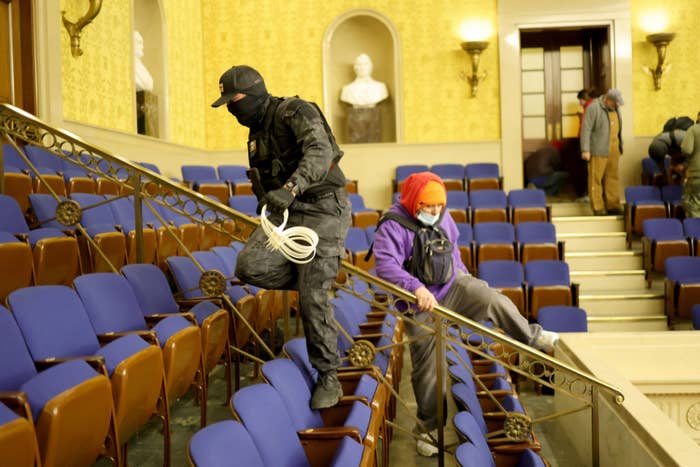
WASHINGTON — Federal prosecutors have dropped a long-standing fight to keep two alleged Capitol rioters in jail, marking one of the highest-profile setbacks for the government in these cases so far.
The US attorney’s office in Washington had spent the past two months arguing to keep Eric Munchel and Lisa Eisenhart behind bars while their cases are pending. In February, a federal judge in DC sided with the government and ordered the mother-son codefendants to stay in jail. But the government notified the judge on Monday that they were backing down; the decision comes three days after a federal appeals court ruled that the DC judge had failed to justify the detention order when the two weren’t charged with assaulting anyone or destroying property.
Munchel — who was photographed inside the Capitol wearing tactical gear and carrying plastic zip-tie handcuffs — and Eisenhart have been in jail since their arrests on Jan. 10 and Jan. 19, respectively. They’ll be released to home detention and location monitoring, which is what a federal magistrate judge in their home state of Tennessee originally ordered shortly after their arrests; they’ll only be allowed to leave home for work, school, medical appointments, religious services, court appearances, and a handful of other preapproved reasons.
In exchange for dropping the detention fight, the government also asked that the two be barred from accessing the internet and using encrypted messaging applications without advance approval and that they be prohibited from contacting anyone involved in the Jan. 6 insurrection. Munchel and Eisenhart agreed to those conditions.
Last week’s decision from the US Court of Appeals for the DC Circuit in Munchel and Eisenhart’s case set a new precedent that binds all of the federal judges in DC presiding over the Jan. 6 cases. It was the first of the Capitol riot cases to reach the appeals court, and the ruling had immediate ripple effects; hours later, a judge in another Capitol riot case cited it in back-to-back decisions, allowing two members of an alleged conspiracy involving members of the Oath Keepers militant group to go home pending trial.
Eisenhart's lawyer Gregory Smith told BuzzFeed News in an email that, "I don’t think the Court of Appeals’ decision left the prosecutors with many options, but I am nevertheless pleased we were able to work out an understanding that will finally allow for my client’s pretrial release."
Munchel's lawyer and a spokesperson for the US attorney’s office did not immediately return requests for comment.
Munchel and Eisenhart are facing a three-count indictment, charging them with trying to obstruct Congress from certifying the results of the presidential election — a felony that carries a maximum sentence of 20 years in prison — and two misdemeanor counts for illegally entering the Capitol and disorderly conduct. Prosecutors argued that the fact that the two picked up plastic zip-tie handcuffs they found inside the Capitol was proof they were looking to restrain or kidnap other people there. Prosecutors also pointed to statements the defendants had made before and after going inside about being ready to “fuck shit up” and “fight.”
The government could have continued fighting to keep Munchel and Eisenhart in jail following the DC Circuit ruling. In a 2–1 decision, the appeals court sent the case back to US District Judge Royce Lamberth instead of reversing him outright and ordering Munchel and Eisenhart to be freed, giving prosecutors a chance to meet the new standard articulated by the circuit.
But in order to successfully reargue for detention, the government would've had to meet a higher bar for proving there were no pretrial release conditions that would keep the community — and Congress — safe. DC Circuit Judge Robert Wilkins, writing for the majority, said that the government needed to present specific evidence that a person posed a threat if they weren’t charged with acts of violence at the Capitol, and had to account for the fact that the unusual circumstances that led to the insurrection were no longer there, at least for now.
“It cannot be gainsaid that the violent breach of the Capitol on January 6 was a grave danger to our democracy and that those who participated could rightly be subject to detention to safeguard the community,” Wilkins wrote. “But we have a grave constitutional obligation to ensure that the facts and circumstances of each case warrant this exceptional treatment.”
The vast majority of the more than 330 people charged in the insurrection have been allowed to go home postarrest while their cases go forward with no objection from the government. The US attorney’s office has mostly reserved detention fights for cases that involve allegations of assault on police, conspiracy and advance planning, and destruction of property. But in some cases, prosecutors have argued that a defendant’s actions on Jan. 6 had sufficiently violent overtones or that they’d made threats of future violence that justified keeping them behind bars.
UPDATE
Updated with comment from Lisa Eisenhart's attorney.

